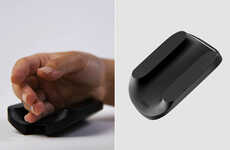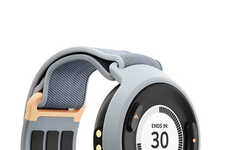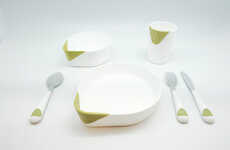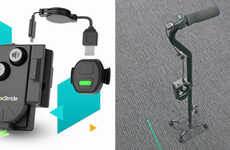
The Liftware Level Smart Fork Has a Motion-Stabilizing Handle
Alyson Wyers — January 5, 2017 — Lifestyle
References: liftware & springwise
Following the release of their tremor-cancelling spoons a few years ago, Liftware has now come up with a smart fork product with motion-stabilizing technology. The Liftware Level makes eating an easier task for people dealing with tremors or limited mobility.
The electronic utensils can stay upright and have more sophisticated technology than previous models, so they can counteract a wider range or hand and arm movement resulting from conditions such as Cerebral Palsy, Huntington's Disease or spinal cord injuries. Many attachments are available to turn the stabilizing smart fork handle into a spoon. The handle contains a rechargeable battery that lasts up to an hour.
This is an example of how design can be used to address health issues and the completion of daily tasks.
The electronic utensils can stay upright and have more sophisticated technology than previous models, so they can counteract a wider range or hand and arm movement resulting from conditions such as Cerebral Palsy, Huntington's Disease or spinal cord injuries. Many attachments are available to turn the stabilizing smart fork handle into a spoon. The handle contains a rechargeable battery that lasts up to an hour.
This is an example of how design can be used to address health issues and the completion of daily tasks.
Trend Themes
1. Tremor-cancelling Utensils - The trend towards developing utensils that can counteract tremors or limited mobility provides an opportunity for companies to create more sophisticated technology for people with disabilities.
2. Motion-stabilizing Technology - The trend towards using motion-stabilizing technology presents opportunities for companies to create products that can assist people with conditions such as Cerebral Palsy, Huntington's Disease or spinal cord injuries in completing daily tasks.
3. Smart Utensils - The trend towards developing smart utensils that can assist individuals with disabilities in completing daily tasks provides an opportunity for companies to create technology that can be customized for each individual's needs.
Industry Implications
1. Assistive Technology - The assistive technology industry can use this disruptive innovation opportunity to develop technology that can significantly improve the lives of individuals with disabilities.
2. Healthcare - Healthcare companies can use this disruptive innovation opportunity to create technology and products that can be integrated into medical treatment and rehabilitation for people with disabilities.
3. Consumer Goods - Consumer goods companies can use this disruptive innovation opportunity to create products that are both functional and innovative for individuals with disabilities, and expand their target market.
4.7
Score
Popularity
Activity
Freshness























